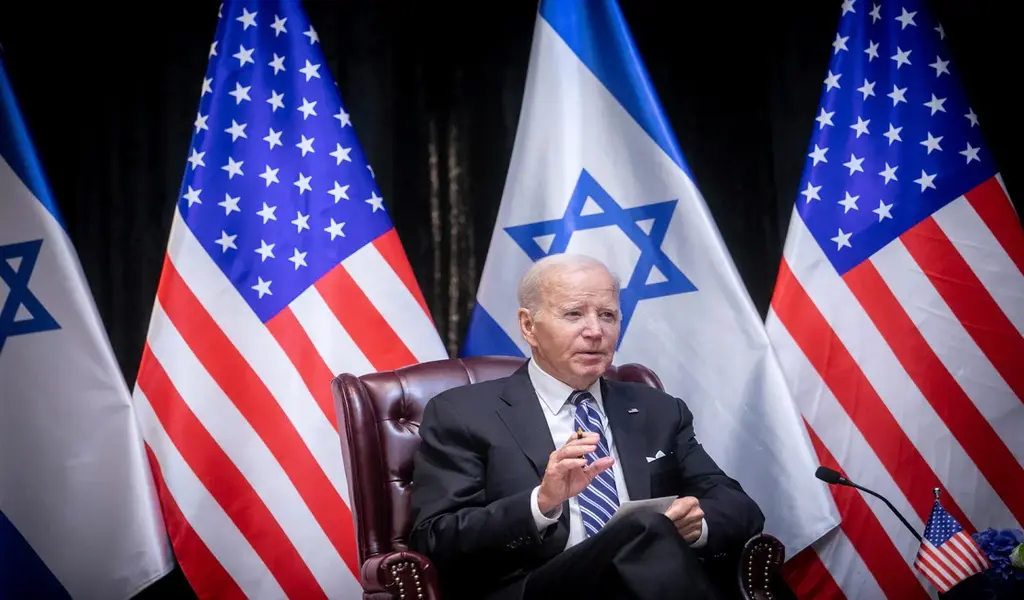(CTN NEWS) – As the Gaza conflict continues, other parts of the Middle East are also experiencing heightened tensions. In Yemen, Houthi rebels launched missiles that were intercepted by a US Navy ship.
Meanwhile, two American bases in Syria came under fire, and in Iraq, drones and rockets targeted US forces. These incidents indicate the potential for broader regional instability.
To deter Iran and its allies, including Syria and Hezbollah, from opening new fronts against Israel, the US has deployed two carrier groups to the eastern Mediterranean.
Additionally, 2,000 US Marines are on standby for possible deployment to the region.
US President Joe Biden expressed strong support for Israel’s campaign against Gaza during his visit to Israel and reiterated this support in a speech from the White House.
While he backs Israel, he also urged Israeli leaders not to act out of anger. Biden has pledged to provide Israel with billions of dollars in additional aid. The United States is facing a growing risk of direct involvement in a regional Middle Eastern conflict.
This situation differs from past campaigns, such as the 1991 Gulf War and the 2003 invasion of Iraq, which were preceded by extensive planning and preparation.
In the current scenario, the US is responding to rapidly evolving events largely beyond its control.
Secretary of State Antony Blinken had an extended meeting with Israel’s war cabinet, and the US is providing significant support to Israel’s war effort, including airlifting large quantities of ammunition and equipment.
The US military presence across the Middle East is extensive and vulnerable, making it a focal point of concern in this increasingly precarious situation.
Regional Rivalries
The United States finds itself in a precarious situation across the Middle East.
It is deploying resources and personnel to deter potential threats from Iran, Syria, and Hezbollah, and is actively involved in the conflict in Gaza by providing support to Israel.
While the U.S. has pledged substantial aid to Israel, there is growing concern about the possibility of direct U.S. involvement in a broader regional conflict.
Secretary of State Antony Blinken and President Joe Biden have engaged with Israeli leaders and their war cabinet, signaling strong support for Israel’s actions in Gaza.
The U.S. is also sending large quantities of ammunition and equipment to aid Israel in its campaign.
This situation presents a considerable risk of U.S. involvement in a Middle Eastern conflict.
Unlike past campaigns, where the U.S. had more control over the timing and scale of military operations, the current circumstances involve responding to events that are largely beyond its control.
It raises concerns about the vulnerabilities of the U.S. military presence across the region, as American forces are stationed in Syria and Iraq, where multiple actors, including Iran and its proxies, operate.
Additionally, Iran’s growing influence and military capabilities pose significant challenges.
Iran has developed advanced weaponry, and its Islamic Revolutionary Guard Corps (IRGC) has gained experience in conflicts across the Middle East.
This includes providing support to groups like the Houthis in Yemen, Hezbollah, Hamas, and others.
The ease of movement for IRGC personnel and resources in the region poses challenges for U.S. forces, which must be transported from the U.S. at considerable cost and logistical effort.
While the U.S. has a powerful military, past experiences in Vietnam and Afghanistan have shown that military might does not guarantee victory against determined and resourceful adversaries.
The potential for further escalation and the opening of new fronts in the Middle East remains a significant concern.
Iranian Foreign Minister Hossein Amir-Abdollahian has warned about the possibility of new fronts emerging if the Israeli offensive in Gaza continues, underscoring the unpredictable and volatile nature of the region.
Protests Against Us and Israel
As the conflict in Gaza intensifies, the Middle East is seething with anger.
Protests have erupted in countries such as Jordan, Lebanon, Libya, Yemen, Iran, Turkey, Morocco, Egypt, and others, not only directed against Israel but also against the United States, Israel’s most vocal and generous supporter.
Jordan’s King Abdullah, traditionally a key US ally, canceled a scheduled summit with President Biden in response to the tragic explosion at Gaza’s Al-Ahli Baptist Hospital.
This was a clear signal of the discomfort felt by these leaders in appearing alongside an American president who so strongly aligned with Israel while the death toll in Gaza continued to rise.
While the US retains allies among the region’s autocratic leaders, the sentiment on the streets is quite different.
The recent explosion at Al-Ahli Baptist Hospital has further inflamed tensions, with Palestinian officials accusing Israel of targeting the hospital, a claim denied by Israel.
During a recent meeting in Cairo, President Sisi of Egypt and King Abdullah issued a joint statement, warning that if the war doesn’t stop and escalates, it poses a significant risk of plunging the entire region into a catastrophic situation.
I’ve spent the past week reporting from the Lebanon-Israel border, which is a potential flashpoint for this catastrophe.
Hezbollah fighters frequently target Israeli military positions, using guided missiles, while the military wings of Hamas and Palestinian Islamic Jihad occasionally launch rockets into Israel.
The Israeli response is to target what they describe as Hezbollah’s military infrastructure.
This situation keeps tensions high but has not yet escalated into full-scale war or drawn the US directly into the conflict.
However, the possibility remains real.
The US has positioned carrier groups in the vicinity to discourage Iran, Hezbollah, and others from crossing certain boundaries.
Should these groups push too far and the US responds, it could trigger unpredictable consequences.
All the elements are now in place for the long-standing Israeli-Palestinian conflict to erupt into a regional catastrophe, with the US potentially caught in the middle.
MORE RELATED NEWS:
Police say 100,000 people gathered in London for Palestine during the crisis in Gaza
Italy’s Prime Minister Giorgia Meloni Announces Separation Amidst Partner’s Scandal
India Successfully Completes Crucial Test In Gaganyaan Crewed Space Mission After Lift-off Delay








